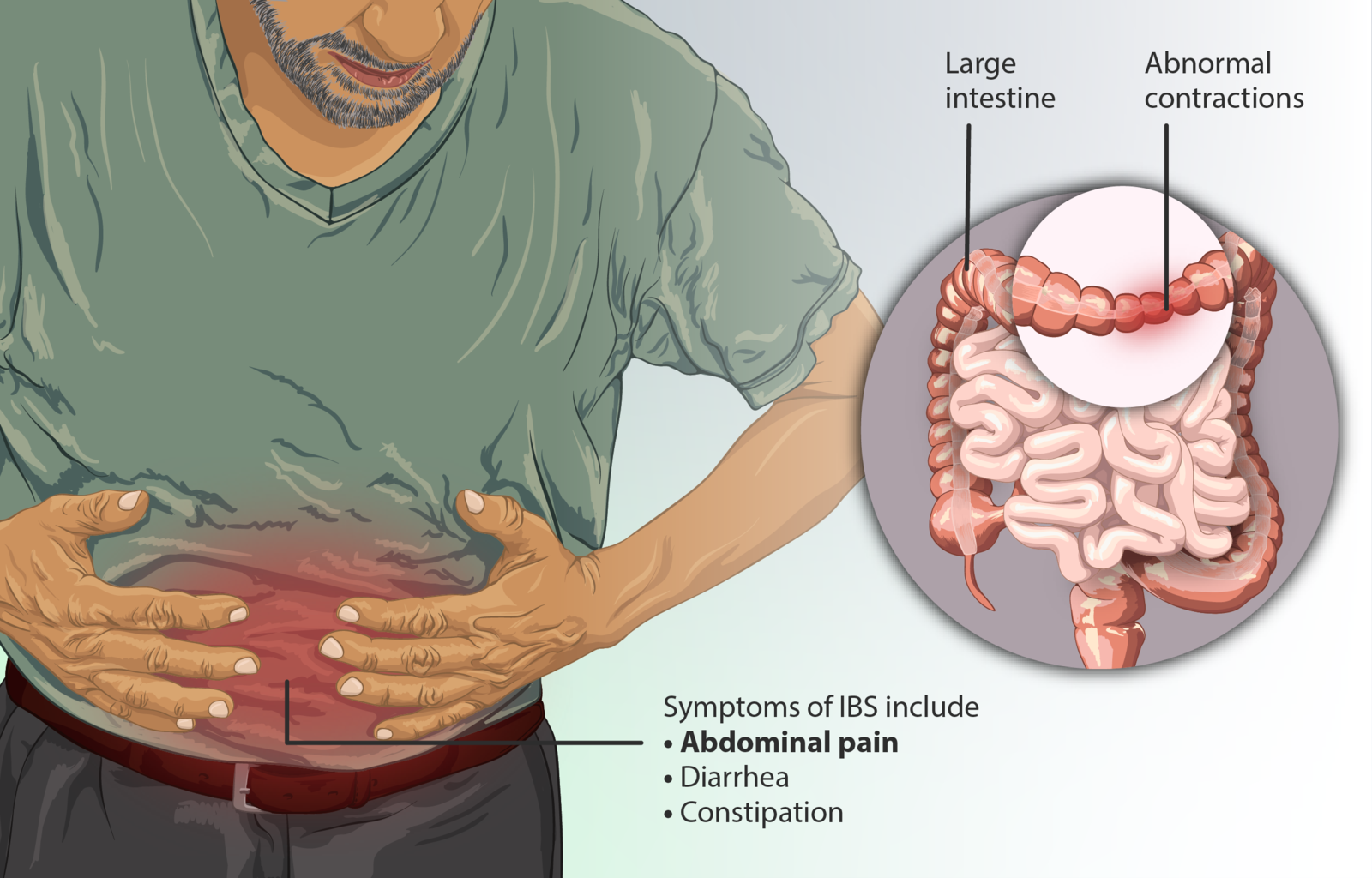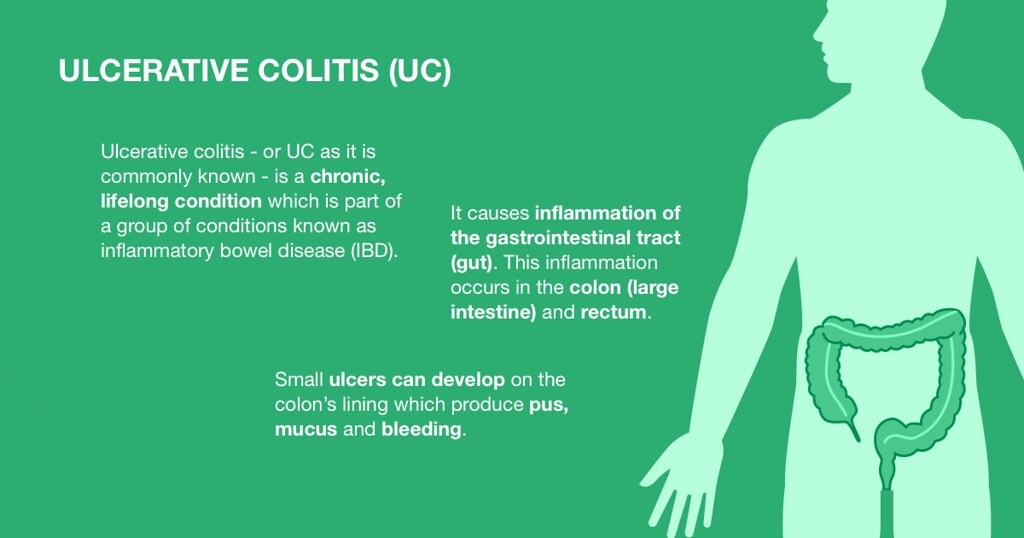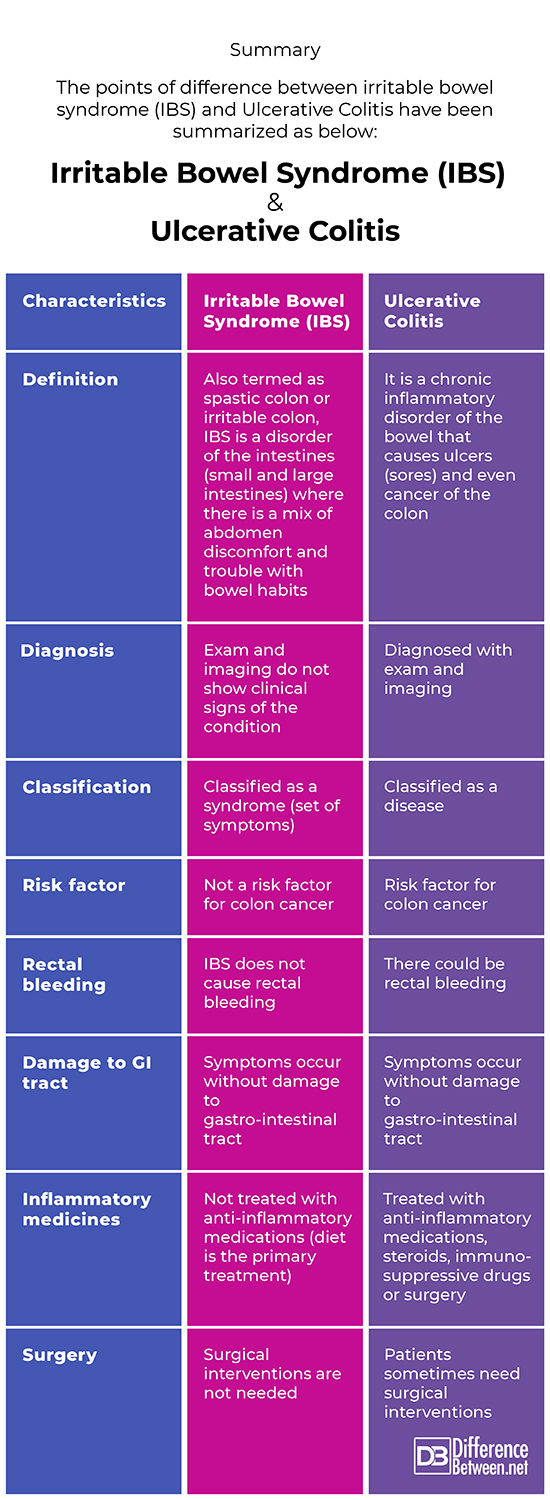Difference Between Irritable Bowel Syndrome IBS and Ulcerative Colitis
What is irritable bowel syndrome (IBS) and ulcerative colitis?
Irritable bowel syndrome (IBS) and ulcerative colitis which is an inflammatory bowel disease (IBD) are two medical conditions associated with the gastrointestinal system. The main difference between irritable bowel syndrome (IBS) and inflammatory bowel disease (IBD) is that the former is a non-inflammatory type of disease and the latter is a chronic inflammatory condition.
The major cause of IBS is disturbance in how the central nervous system and the gut interact and is aggravated by the emotional stress. Ulcerative colitis which is an IBD is caused by an abnormal response from the defense system of our body (immunity), mistaking healthy cells and bacteria in the gut for dangerous foreign agents.
Similarity
- Abdominal discomfort and pain
- Common symptoms include diarrhea and constipation
- Changes in bowel movements
- Both are associated with an imbalance in the gut microbiome (DYSBIOSIS)

Irritable Bowel Syndrome (IBS)
It is a condition of the gut where there are recurrent bouts of abdominal pain and discomfort. Other symptoms include bloating, cramping, inability to empty bowels, nausea, indigestion, diarrhea and constipation.

Ulcerative Colitis
Ulcerative Colitis is a type of IBD – Inflammatory Bowel Disease. This disease results in the inflammation of the colon. Symptoms include blood in the stool, leaky gut, leg cramps and primary sclerosing cholangitis
Difference between Irritable Bowel Syndrome (IBS) and Ulcerative Colitis
Description
Irritable Bowel Syndrome (IBS)
IBS is a disorder of the gastrointestinal (GI) tract. It is not a progressive disease but a functional disorder. It is triggered by emotional stress, hormonal disturbances and gaseous distention
Ulcerative Colitis
Ulcerative Colitis is a type of IBD which is basically an inflammation of the gut (bowel) wall, which can lead to sores and narrowing of the intestines. This condition is not linked with any obvious triggers, and is characterized by alternating bouts of flares and remissions.
Symptoms
Irritable Bowel Syndrome (IBS)
- Recurrent pain in the abdomen
- Cramping or discomfort
- Anxiety
- Depression
- Appetite loss
- Discomfort
- Urgency to defecate
- Bloating
- Alternating constipation and diarrhea
Ulcerative Colitis
- Blood in the stool
- Loss of appetite
- Weight loss
- Urgency to defecate
- Rectal and abdominal pain
- Blood or pus in diarrhea
Some additional conditions include;
- Fever
- Eye inflammation
- Mouth sores
- Join swelling
- Anemia
Causes
Irritable Bowel Syndrome (IBS)
The exact cause of IBS is unknown. One possible cause is overly sensitive colon. Some factors that trigger this condition include;
- A surplus of bacteria in the intestines
- Muscle contraction in the intestines
- Early life stress (some stressful events that might shave happened in the childhood)
- Changes in gut microbes
- Abnormalities in the nerves in your digestive system
- Levels of neurotransmitters (chemicals messengers that transmit nerve signals) and GI hormones are modified in some people with irritable bowel syndrome
- Food intolerances
Ulcerative Colitis
The major cause is the overactive immune system. Several factors that result in overactive immune system include
- Genetics and family history
- Other immune disorders
- Environmental factors like bacteria, viruses, and antigens
Summary
The points of difference between irritable bowel syndrome (IBS) and Ulcerative Colitis have been summarized as below:

FAQ
Can IBS lead to ulcerative colitis?
There is no medical evidence that irritable bowel syndrome is a forerunner of inflammatory bowel disease like ulcerative colitis. Irritable Bowel Syndrome is a syndrome and a functional disorder that changes the way the bowel functions. It is not a progressive disease.
How can I cure IBS permanently?
There is no permanent and medically known cure for IBS, but there are several tips that serve as treatment options to alleviate or get rid of the symptoms. Lifestyle tips include dietary modifications, high fiber diet (fruits, vegetables, and whole grains), physical exercise, stress management and prescription medications. There is no specific diet for irritable bowel syndrome, and different individuals react differently to different foods.
Can IBS turn into Crohn’s disease?
There is no medical evidence that irritable bowel syndrome progresses to any other sickness or disease like Crohn’s disease or even results in any aggravating medical conditions outside of the regular symptoms. Irritable Bowel Syndrome is a syndrome and a functional disorder that changes the way the bowel functions. It is not a progressive disease.
Does IBS get worse with age?
IBS is long-term (chronic) disorder of the gut and is an inevitable part of aging. It comes and goes over time. The sensitivity of the gut nerves may elevate with age and the symptoms overlap is possible. Different signs and symptoms related to IBS may show up with age. However, there are some ways like exercise, avoidance of foods that irritate the digestive system etc. that help to help reduce the overall risk of IBS and aid in reducing the symptoms.
- Difference Between Global Warming and Greenhouse Effect - May 18, 2024
- Difference Between Vaccination and Immunization - March 3, 2024
- Difference Between Selective Mutism and Autism - February 25, 2024
Search DifferenceBetween.net :
Leave a Response
References :
[0]Bercik, P., Verdu, E. F., & Collins, S. M. (2005). Is irritable bowel syndrome a low-grade inflammatory bowel disease? Gastroenterology Clinics, 34(2), 235-245.
[1]Quigley, E. M. (2005). Irritable bowel syndrome and inflammatory bowel disease: interrelated diseases? Chinese journal of digestive diseases, 6(3), 122-132.
[2]Quigley, E. M. (2016). Overlapping irritable bowel syndrome and inflammatory bowel disease: less to this than meets the eye? Therapeutic advances in gastroenterology, 9(2), 199-212.
[3]Image credit: https://live.staticflickr.com/4644/25628640948_105714174d_b.jpg
[4]Image credit: https://commons.wikimedia.org/wiki/File:Depiction_of_a_person_suffering_from_Irritable_Bowel_Syndrome_(IBS).png
